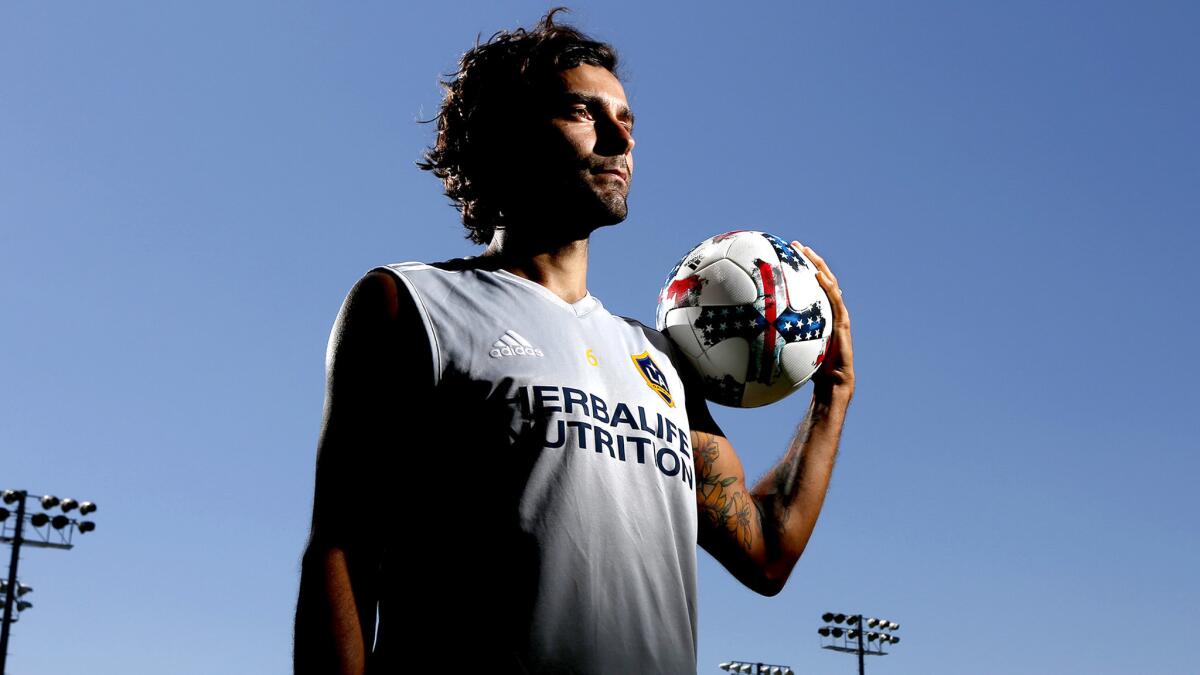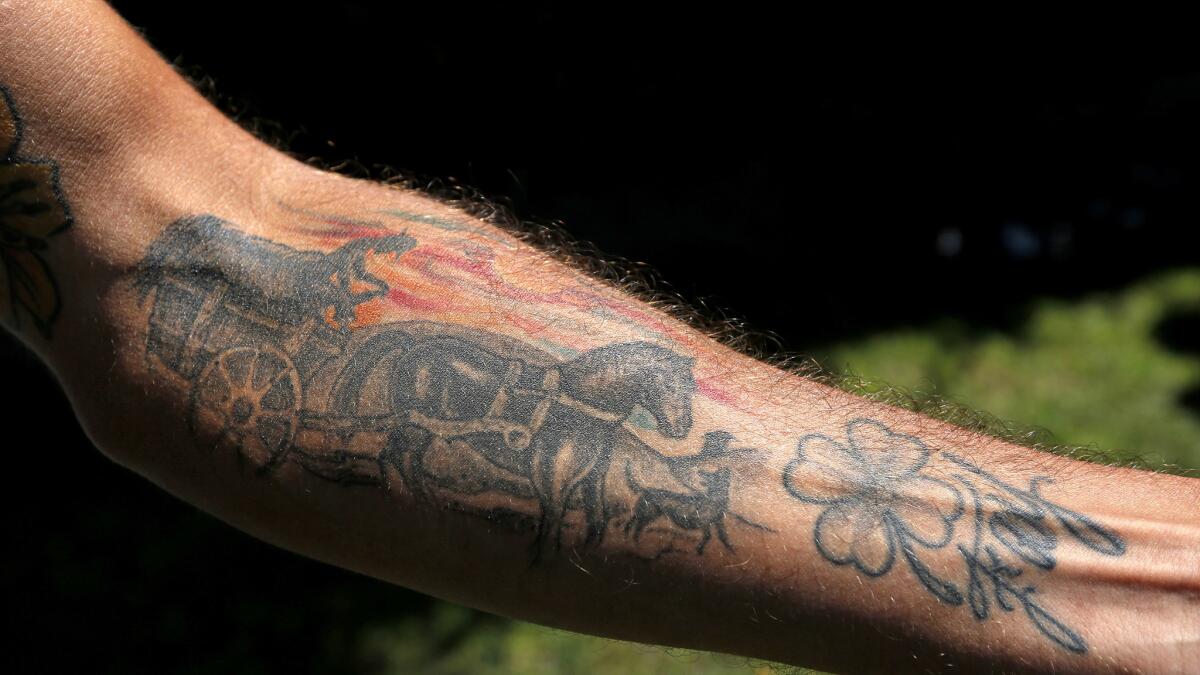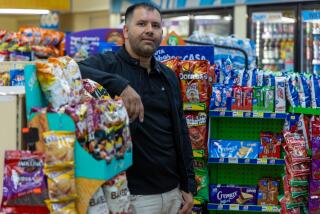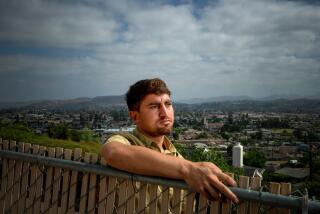The Galaxy’s Baggio Husidic escaped war-torn Bosnia as a child. Now he wants the same chance for Syrian refugees

LA Galaxy player Baggio Husidic talks about his family escaping war-torn Bosnia when he was young.
The video is more than two years old, the memories it evokes far older.
But for Baggio Husidic, the pain is still fresh.
In the tape, hundreds of Syrian refugees rush across an open field in an effort to escape Hungarian police when a camerawoman sticks out her left leg and trips Osama Abdul Mohsen, a 52-year-old man carrying his 7-year-old son. The man falls atop the boy who, frightened and hurt, begins to wail.
“That was really crushing to me,” Husidic, a Galaxy midfielder, says, his voice quavering. “Because that was literally my dad carrying us around.”
Husidic was 7 when his family fled the Bosnian War, a conflict that killed 100,000 and displaced 2.2 million more — many of them Muslim, like the Husidics — between 1992 and 1995.
“It was genocide,” he says. “People just don’t want to call it that.”
Over the last six years, those horrors have been repeated — only on a much larger scale — in Syria, where a civil war has resulted in more than 320,000 deaths and has forced more than 5 million to flee their homeland, according to the United Nations.
Many of those refugees are children, and Husidic sees himself in each of them. But there is a big difference between then and now, he says. Many Western countries, including the U.S., which welcomed Bosnian refugees, have turned their backs on the Syrians, citing fears of terrorism.
Husidic says he no longer can sit quietly by and watch the shunning happen.
Typically laid back and smiling, he goes cold talking about the international response to what the U.N. has called the worst refugee crisis since World War II. And he grows angry at politicians and the media who have added to the suffering by scapegoating Muslims.
People don’t understand. They don’t want to leave everything they have at home — their families, their friends, their comfort — and just go into the unknown.
— Baggio Husidic, whose family fled war-torn Bosnia, regarding Syrian refugees

“People who think that have been brainwashed,” he says, standing in a darkened dining room at the StubHub Center after a morning training session.
Yet President Trump has twice signed executive orders — blocked by federal courts — that placed a temporary ban on travel to the U.S. for people from six Muslim-majority nations and suspended the nation’s refugee resettlement program while limiting the number of refugees the country will accept to 50,000, less than half the 110,000 cap approved under the Obama administration.
“I wouldn’t be here if those doors weren’t open,” says Husidic, a naturalized citizen who considers himself a patriotic American. “People don’t understand. There’s kids who have no part in this. There’s families who have no part.
“They don’t want to leave everything they have at home — their families, their friends, their comfort — and just go into the unknown. They’re forced to do this by external factors that they can’t control. If they had a choice, why would they leave everything?”
Husidic says his family never wanted to leave their home in Velika Kladusa, a small town near the border with Croatia. Both his parents, Zarif and Zamira, were college-educated accountants who managed a shopping center and drove luxury cars. The family was comfortable, if not affluent.
Then, just before Husidic turned 5, war broke out. What started as a battle over territory soon dissolved into ethnic cleansing, pitting Orthodox Serbs, Catholic Croats and Bosnian Muslims against each another.
The Husidics are not devout Muslims, but that didn’t matter; they were targeted anyway.
“A lot of my family died,” Husidic says.
“I’ve seen people [blown] in half. I’ve seen hands, fingers, legs, people stepping on mines. Dead people. Starved people. It’s hard to look at a picture, but it’s different to walk by it. And there’s nothing you can do.
“You’re thinking, ‘I don’t want to die here. I want to go somewhere I know someone’s not go bomb me or shoot me.’ ”
So the family fled, crossing the border into Croatia only after agreeing to trade their Mercedes to a soldier in exchange for safe passage. Shortly afterward, their house was destroyed in a bombing raid, and there was no turning back.

A family who once had everything suddenly had nothing. They were forced to pass through a series of squalid refugee camps before settling in a government housing project outside Hamburg, Germany, where they found both running water and brutal racism.
Husidic says he was repeatedly bullied by children opposed to having war refugees in their neighborhood. And each day after school, local kids would confront him and his brother with taunts: “Go back to your country.”
On most days, the chants led to fights.
Eventually, the Husidics found their way to Chicago, lugging everything they still owned in two suitcases. Baggio Husidic left Germany wearing a San Francisco 49ers hat he still owns.
His parents’ college degrees were not accepted in the U.S. so they worked in a cold, drafty warehouse packing pens and pencils into boxes for $7 an hour. Husidic’s father also worked in construction, the two jobs affording him little sleep but, over time, allowing him to afford a one-bedroom apartment, then a two-bedroom — and eventually a rambling house in a suburb north of the Windy City.
His mother, who started out working in a warehouse, eventually got a job managing one for Abbott Laboratories; she hasn’t missed a day of work in 19 years.
Husidic and his older brother, Alen, both went to college, with Alen landing a job as a freight broker that paid him $250,000 a year. Baggio, 29, a seven-year MLS veteran who has appeared in 143 games with two teams and won an MLS Cup with the Galaxy, will make $175,000 this season.
It was the American dream writ large: They grasped the helping hand the U.S. extended, then paid back that debt many times over. Husidic says that hardly makes them rare among the refugee families he knows.
“That’s what America is,” says Husidic, a solid box-to-box midfielder whose play is more safe and solid than it is flashy. “People start small, and then they end up somewhere.”
Studies bear that out. According to the Center for Immigration Studies, immigrants — including refugees — add more than $1.6 trillion to the U.S. gross domestic product.
“Refugees come here with nothing or next to nothing. But they go to work very quickly,” says Randy Capps, director of research for U.S. programs at the Migration Policy Institute, a nonpartisan Washington, D.C.-based think tank. “Within 10 years, they’re usually, on average, earning pretty close to what the average American earns.”
Some refugees from the Middle East in general — and Syria in particular — do even better.
“There’s this huge misconception that the U.S. is getting immigrants and refugees from Muslim countries that are poor and not contributing,” Capps says. “Actually, the reverse is true. Historically, we’ve been getting the best and the brightest.”
The link between Muslim refugees and terrorism also is specious, Capps says.
“The actual involvement of a refugee in terrorist activity on U.S. soil is almost nonexistent,” he says. “Closing the doors on refugees, there’s no evidence to suggest that that’s a flow for terrorists.”
Yet that argument is being used to halt the admittance of migrants to the U.S. and other Western countries. And it fueled a 57% increase in anti-Muslim violence in the U.S. in 2016, according to a report released Tuesday by the Council on American-Islamic Relations.
“Every article I read is negative about refugees — how they’ll ruin America,” Husidic says. “But what about a story like mine? All the stuff my family had to sacrifice and go through and the amount of racism we had to encounter and the amount of hatred.
“It’s a tough, tough road.”
He thinks back to the man in the video, who was a soccer coach in Syria. The shocking images also were seen by Miguel Angel Galan, president of a soccer academy in Madrid, who offered Mohsen a job and an apartment for his two boys without looking at a résumé or conducting an interview.
A year later the rest of Mohsen’s family — a wife and two children — remained trapped in Turkey, unable to pay traffickers to get out.
Husidic thinks of his own father. Could he have made the decision to split the family? Should any parent ever be faced with such a choice?
Asked what he would tell Trump if he ever met the president, Husidic pauses.
“I would tell him my story,” he says quietly. “And hopefully change his mind.”
Twitter: kbaxter11







